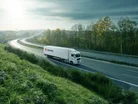DB Schenker Tackles Scope 3 Emissions With Battery Swapping

DB Schenker, in partnership with Trailer Dynamics and CATL, is pioneering a battery-swapping initiative for electric trailers across Europe.
This initiative marks a groundbreaking step toward reducing Scope 3 emissions in the logistics sector. The collaboration addresses several crucial areas, from upstream transportation to the end-of-life treatment of batteries, setting a new sustainability standard for logistics operations.
- Category 4 - Upstream Transportation and Distribution: The battery-swapping technology aims to improve the efficiency of electric trailers and trucks in logistics operations across Europe.
- Category 7 - Employee Commuting: While not directly mentioned, the improved efficiency of EVs could potentially impact employee commuting if the technology is adopted more broadly.
- Category 11—Use of Sold Products: Trailer Dynamics' eTrailer technology focuses on reducing diesel consumption and CO2 emissions, which directly relates to customers' use of their products.
- Category 12—End-of-Life Treatment of Sold Products: Battery-swapping technology could potentially improve the lifecycle management of batteries used in EVs.
- Category 15—Investments: DB Schenker's investment in the project and assessment of suitable locations for battery-swapping stations across Europe fall under this category.
Boosting efficiency in upstream transportation and distribution
Battery-swapping technology aims to transform the operational efficiency of electric trailers and, potentially, trucks across Europe. By enabling quick, five-minute battery swaps, the technology reduces vehicle idle times and ensures that EVs remain active, significantly cutting downtime in logistics.
Wolfgang Janda, EVP at DB Schenker Europe, stated: "Battery swap technology will play a crucial role in overcoming charging infrastructure challenges and supporting the market ramp-up of zero-tailpipe-emission heavy goods transport specifically in Europe."
The increase in efficiency is particularly relevant for heavy-duty transport, which has traditionally relied on fossil fuels. With rapid battery replacement, electric trailers could match or even exceed the productivity levels of their diesel counterparts.
Lowering CO2 emissions in product use
Trailer Dynamics' eTrailer technology is designed to reduce diesel dependency and lower CO2 emissions, providing an electric drive that complements existing transport solutions.
This approach directly affects the logistics industry's carbon footprint by decreasing the emissions associated with vehicle operations.
Abdullah Jaber, CEO of Trailer Dynamics, explains: "Battery swap technology has the potential to maximise the uptime of our vehicles and reduce CO2 emissions throughout Europe."
The enhanced uptime and reduced emissions highlight the environmental and operational benefits of eTrailers, which promise to reshape how companies approach sustainable logistics.
Addressing energy-related emissions with a battery-swapping network
The collaboration includes developing a network of battery-swapping stations throughout Europe and improving the efficiency and sustainability of the charging infrastructure for electric logistics vehicles.
By establishing a widespread network, the project could drastically reduce traditional charging methods' energy demands and associated carbon emissions, benefiting both logistics providers and the environment.
Sustainable investments driving change
DB Schenker's investment in this initiative aligns with its longstanding commitment to eco-friendly logistics solutions.
With decades of experience and an extensive network, the company is evaluating potential locations across Europe for battery-swapping stations, aiming to create a reliable infrastructure that could serve as a foundation for the widespread adoption of electric trailers.
Wolfgang states, "This project is a clear commitment of DB Schenker to a low-emission and efficient transport industry in Europe."
The company's investment is not just about immediate gains; it's about setting the stage for sustainable logistics infrastructure that meets future demands.
Partnering with CATL for sustainable battery design
Partnering with CATL, a leader in advanced battery technology, provides DB Schenker and Trailer Dynamics access to sustainable battery designs and production techniques.
CATL's role is crucial to ensuring the project aligns with green principles, including energy efficiency and battery lifecycle management.
"We're excited to combine our technology and experience with the industry knowledge and operational expertise of DB Schenker and Trailer Dynamics to accelerate the transition to emission-free transportation in Europe."
Future-proofing battery lifecycle management
While end-of-life treatment of batteries isn't explicitly covered in this project, the potential exists to integrate recycling and reuse strategies.
Battery-swapping stations can optimise battery lifecycles by providing monitored and controlled environments, supporting sustainability in an area often overlooked in Scope 3 emissions.
Scope 3 emission reductions
The comprehensive initiative spans the logistics value chain, addressing multiple Scope 3 emission categories. DB Schenker's approach demonstrates a forward-thinking strategy in indirect emissions management, with promising potential to reshape logistics in Europe.
The combined expertise of DB Schenker, Trailer Dynamics and CATL could set a benchmark for reducing the carbon footprint in global logistics, paving the way for an industry-wide transformation in sustainable transport.
Also check out our sister brand, Sustainability Magazine and sign up to its global conference series - Sustainability LIVE.
Scope 3 Magazine is a BizClik brand.
- Maersk Sustainability Reporting: Navigating Scope 3Transportation & Logistics
- XPO & SOPREMA: Scope 3 Partnership for SustainabilitySupply Chain Sustainability
- Hindalco Scope 3 Strategy: Sustainable ManufacturingCircular Economy
- First Student's Electric Buses: A Scope 3 RevolutionScope 1 2 and 3
Featured Articles
Estonia, Latvia and Lithuania join the European grid, cutting ties with Russian energy, a move that boosts regional security and sustainability
TÜV SÜD: New battery regulations bring Scope 3 hurdles, requiring sustainable sourcing, digital traceability and design changes increasing compliance
Nissan is scaling up its use of green steel, reducing CO2 emissions in its supply chain as part of its goal to achieve carbon neutrality by 2050

